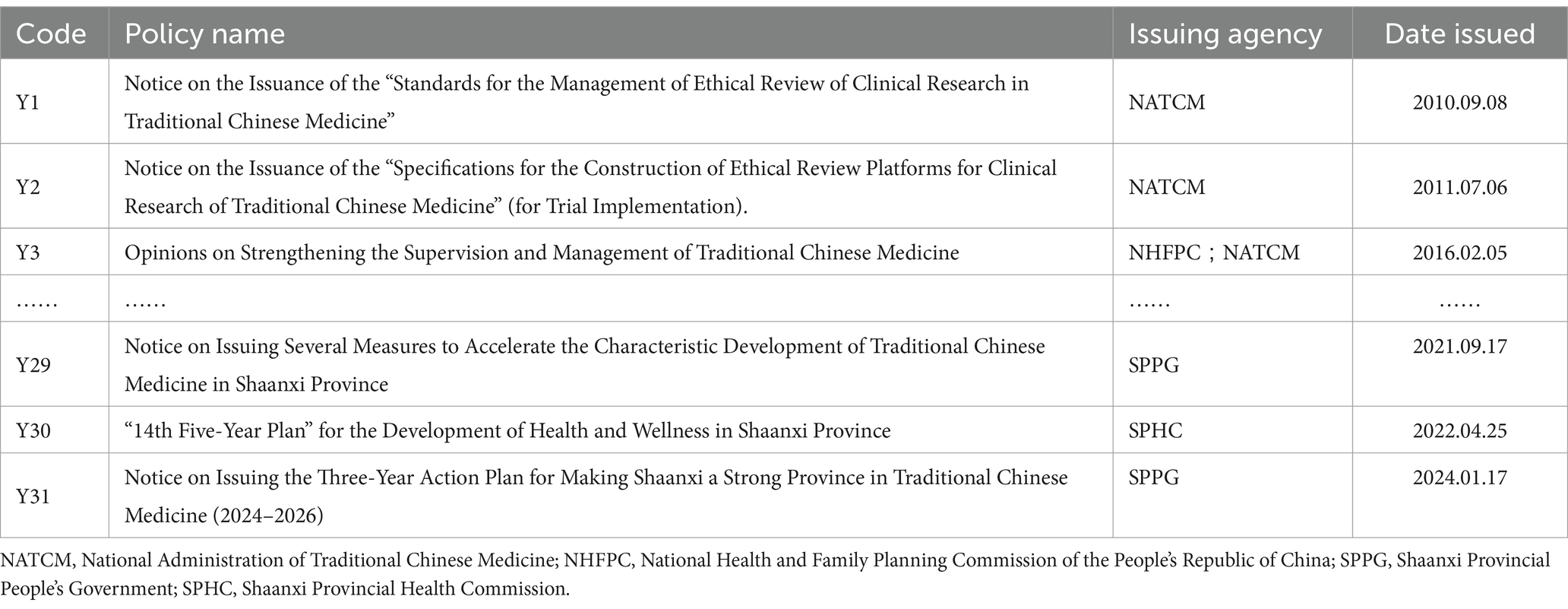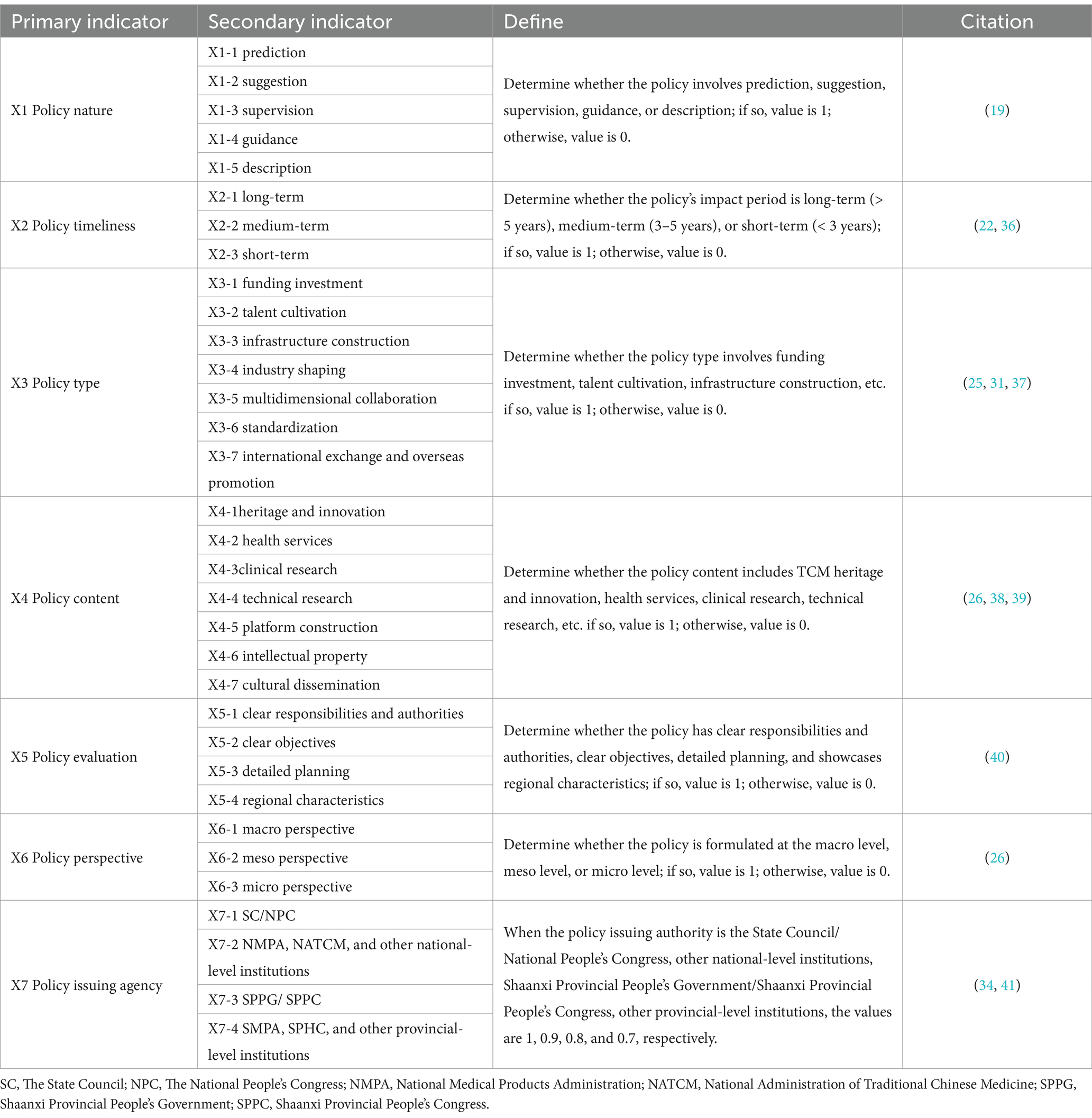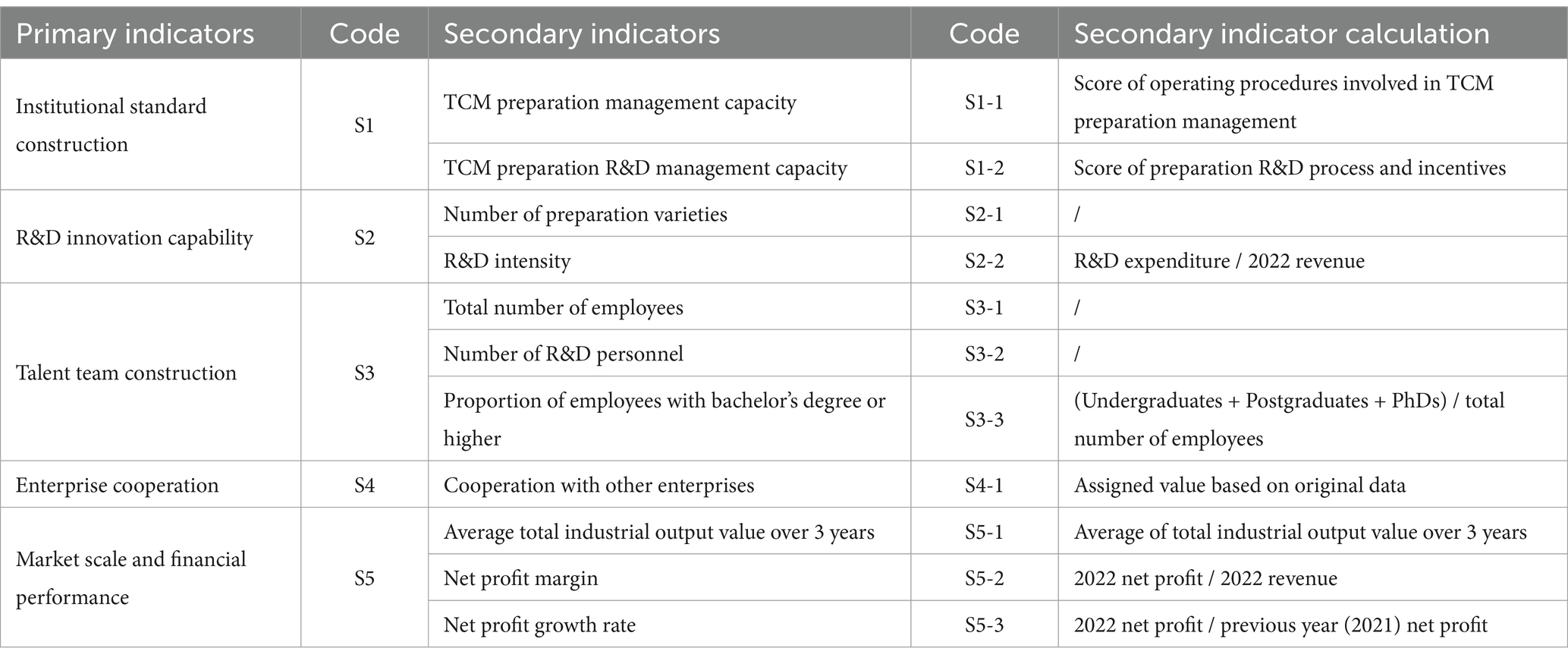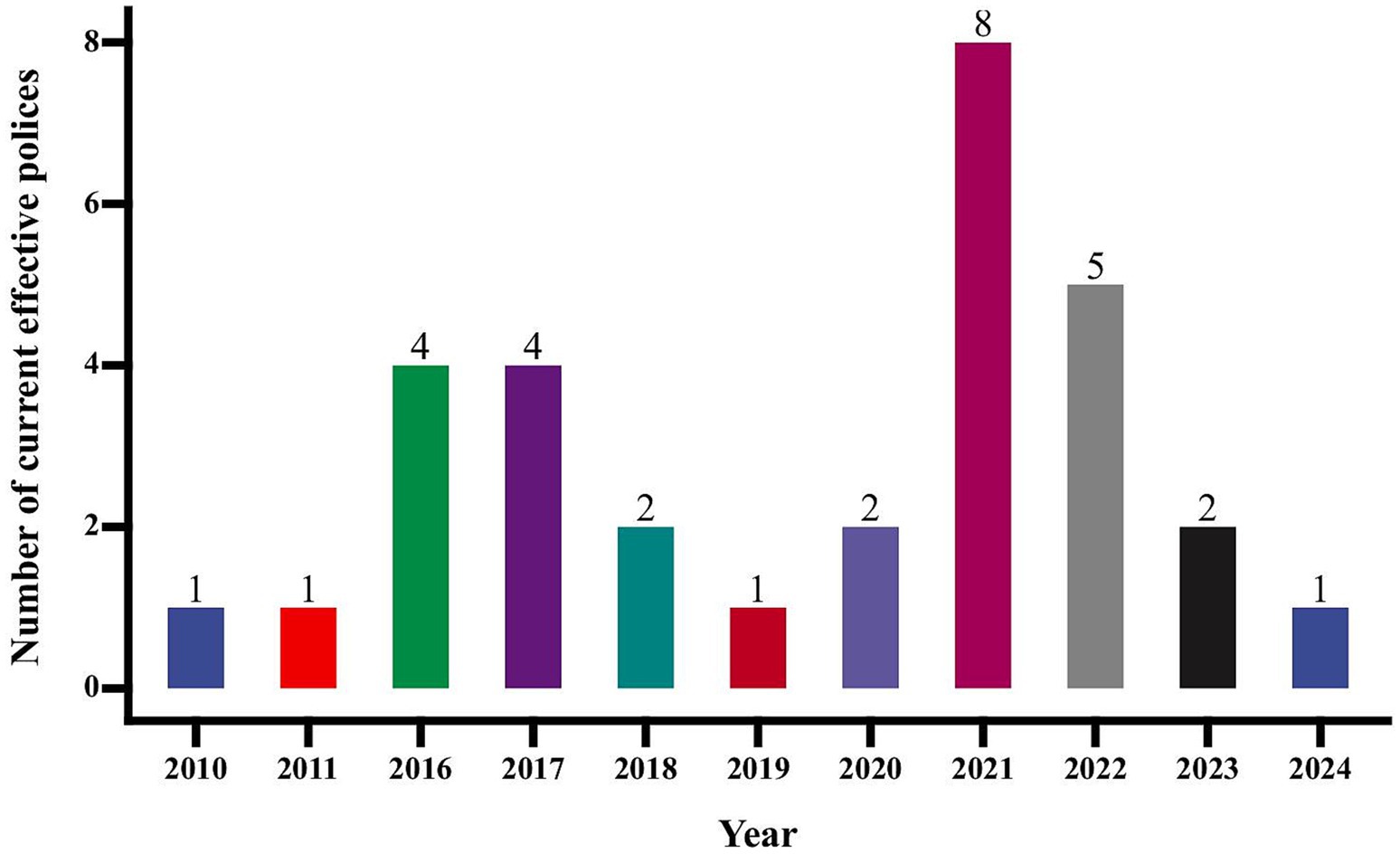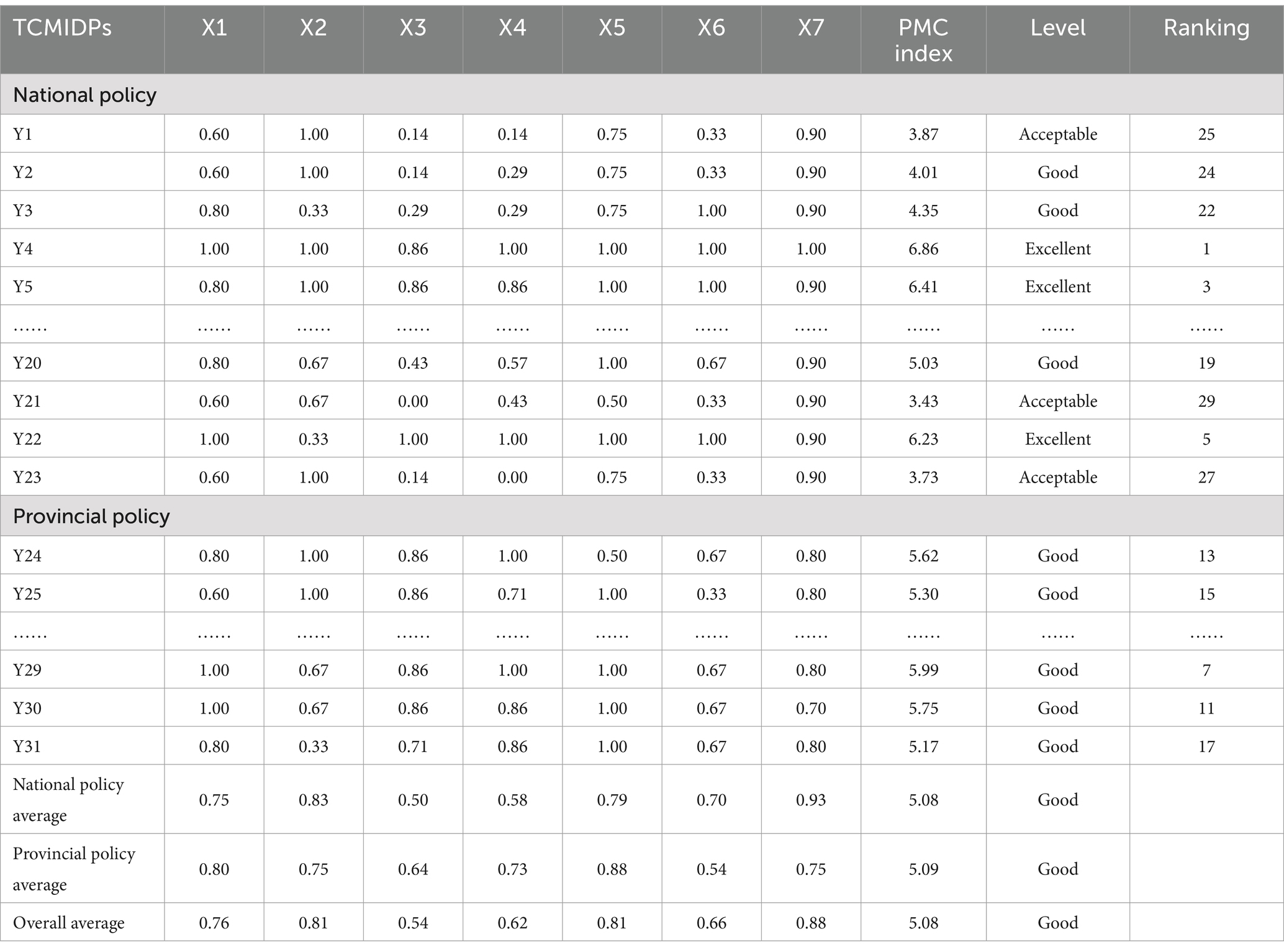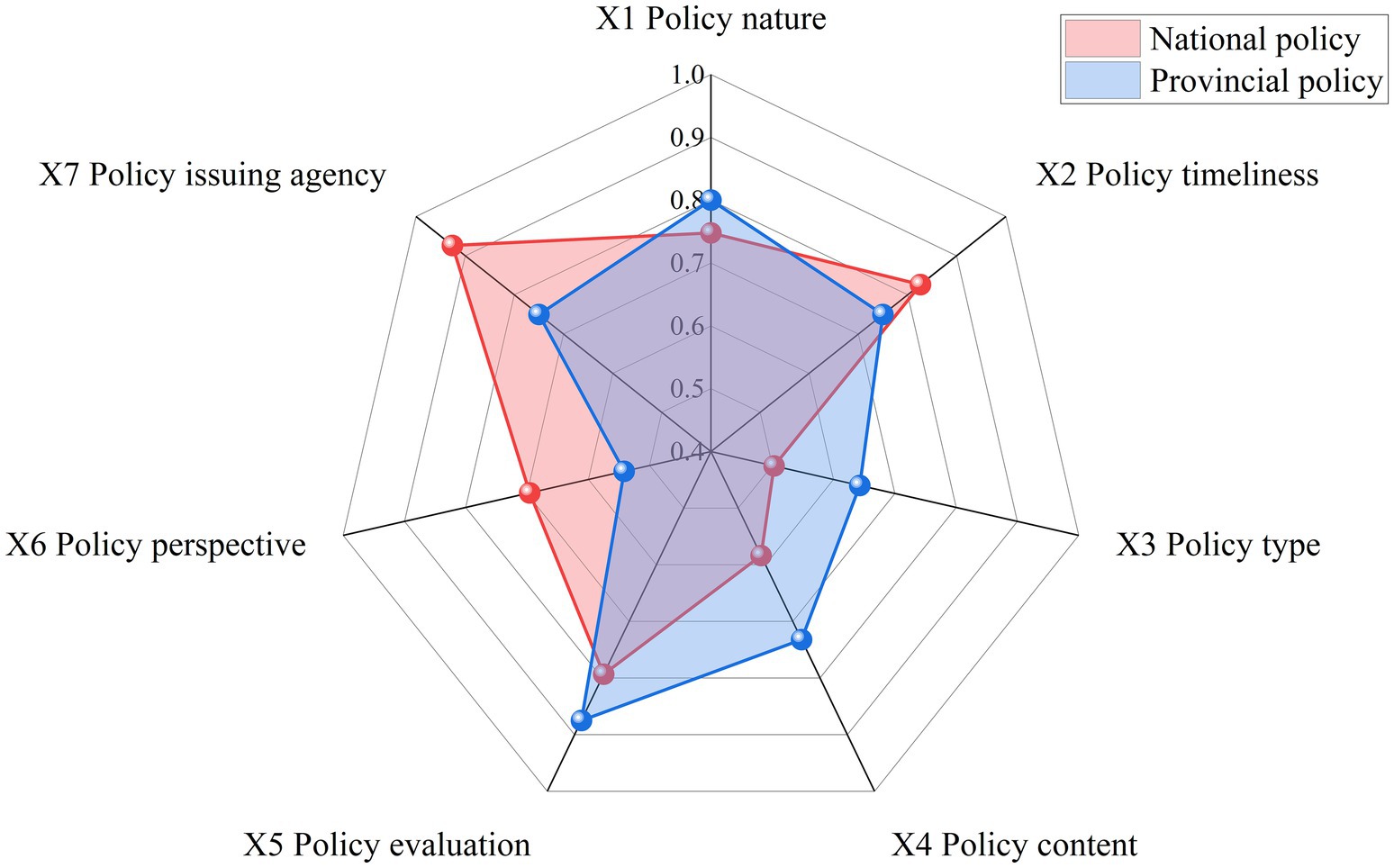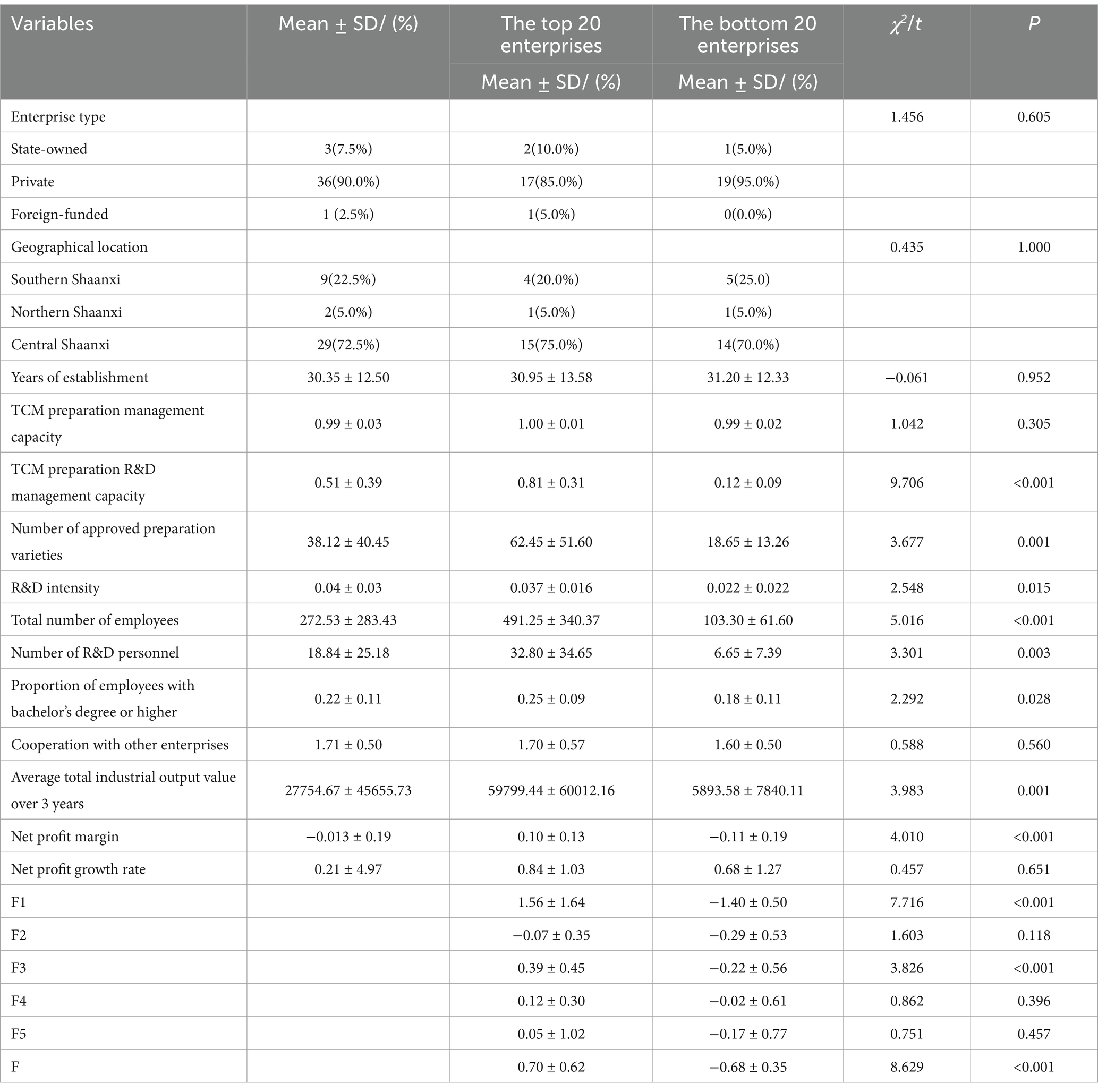- Department of Pharmacy Administration, School of Pharmacy, Xi’an Jiaotong University, Xi’an, Shaanxi, China
Background: The high-quality development of the traditional Chinese medicine (TCM) industry is dependent on supportive policies and requires higher levels of coordination and integration. National and local government policies must coordinate the integrated development of the TCM industry under modern governance principles. However, the policy structure and its impact on the development of the TCM industry have not been thoroughly explored from the perspectives of policy design and empirical evidence.
Methods: A TCMIDPs evaluation system was established using the PMC-Index model to quantitatively analyze TCMIDPs in China and Shaanxi Province. Additionally, principal component analysis (PCA) was used to comprehensively evaluate 51 enterprises in Shaanxi Province.
Results: The policy analysis shows that the average PMC index of the 31 TCM industry development policies is 5.080, indicating that the areas and functions covered by these policies need improvement. The comprehensive evaluation reveals that pharmaceutical enterprises in Shaanxi Province still exhibit unbalanced development.
Conclusion: Future TCM industry policies should focus on long-term industrial development, incorporating comprehensive perspectives. Emphasis should be placed on strengthening enterprise R&D, accelerating pharmaceutical innovation, and promoting the holistic development of pharmaceutical enterprises.
1 Introduction
In China, traditional Chinese medicine (TCM) has a history spanning thousands of years and is a crucial part of traditional Chinese culture (1). Evidence suggests that TCM has played a significant role in disease treatment, preventive healthcare, and public health (2–4). In 2019, the World Health Organization (WHO) included TCM diagnostics in the 11th revision of its International Classification of Diseases (ICD-11), allowing for statistical data that encompasses information beyond western medicine, with long-term implications for TCM (5, 6). Countries including the United States, Canada, and Australia have established formal education and certification systems for TCM (7–9). Additionally, several countries have established dedicated TCM research institutions and treatment centers (10), reflecting the growing global interest and recognition of TCM.
The TCM industry is a major component of China’s economy (11), covering sectors such as the cultivation, processing, and sale of medicinal herbs, as well as the research and production of TCM formulations (12). The Chinese government has concurrently implemented various policy measures (13, 14) and allocated substantial financial resources to support innovation and technological advancements in TCM (15, 16), aiming to promote exports and regional economic development. Despite these efforts, the TCM industry faces several challenges, including insufficient standardization and regulation of medicinal material production, limited innovation and research capacity for TCM products, small-scale enterprises, and weak brand influence (15, 17, 18). These challenges undermine the global competitiveness of TCM products, hindering the industry’s overall growth. Furthermore, the impact of government policies on the TCM industry and its current development requires further investigation.
Policy evaluation has become crucial in addressing these challenges. Sustainable, high-quality development of the TCM sector requires strong policy support and improved coordination across levels. Industrial promotion policies at national and local levels should integrate TCM industry and service development within modern governance frameworks. Existing studies indicate that the PMC-Index model provides a comprehensive approach to evaluating industrial promotion policies, offering valuable insights and methodologies. This model has been widely used to assess policies in various fields, including economics, employment, and healthcare (19–21). Compared to other evaluation methods, it integrates qualitative and quantitative analysis effectively, providing a more holistic and objective assessment (22).
The Shaanxi region is a crucial production area for authentic medicinal materials in China and exhibits regional characteristics in developing the TCM industry (23). Therefore, this study aims to explore the TCM industry’s development from this perspective. Considering that existing research has yet to analyze the policy structure and its impact on TCM industry development from the perspectives of policy design and empirical evidence, this research uses the PMC-Index model to construct a reasonable evaluation index system for TCM industry development policies (TCMIDPs), analyzing the quality of TCMIDPs from a policy perspective. Simultaneously, using principal component analysis (PCA), it investigates the main issues of the TCM industry in Shaanxi by collecting data from 51 TCM preparation enterprises in the region and proposes improvement paths.
2 Methods
2.1 Policies analysis based on the PMC index model
2.1.1 Policy collection
Keywords such as “TCM,” “TCM planning,” and “TCM industry” were used to search the official websites of relevant departments, including the state council (SC), National Medical Products Administration (NMPA), National Administration of traditional Chinese medicine (NATCM), Shaanxi provincial People’s government (SPPG), and Shaanxi medical products administration (SMPA), among others, to collect TCMIDPs.
The policy screening strategies were as follows: (1) Policies issued from January 2004 to January 2024 were included; (2) National and Shaanxi provincial policies were incorporated; (3) Policies aimed at TCM enterprises that directly reflect the theme of TCM were considered; (4) Policies that have been modified or repealed were excluded; (5) Policy documents mainly covered regulations plans outlines opinions and notices on TCMIDPs in China. Finally a total of 31 policy texts were collected to discuss the situation of TCMIDPs at the national and Shaanxi provincial levels as shown in Table 1.
2.1.2 Construction of the PMC index model
The PMC evaluation index model, initially proposed by Ruiz Estrada (24), was refined using extensive literature on the TCM industry. It included five main steps: (1) preprocessing (filtering and coding) of the TCMIDPs; (2) constructing an evaluation index system for quantitative analysis; (3) categorizing variables and determining parameters; (4) constructing multi-input–output tables; and (5) measuring the PMC index.
Building on the classic framework of the PMC-Index model and the characteristics of TCMIDPs, a comprehensive PMC evaluation index system was developed. Seven primary indicators were included: policy nature (X1), policy timeliness (X2), policy type (X3), policy content (X4), policy evaluation (X5), policy perspective (X6), and policy issuing agency (X7). These primary indicators are further divided into 30 secondary indicators, which aim to cover the content and structural elements of the TCMIDPs comprehensively. Table 2 illustrates the selection and explanations of these evaluation indicators.
2.1.3 Measurement of the PMC index
The secondary indicators under the first six primary indicators follow a [0,1] binary distribution (Equations 1 and 2), while the indicators under X7 have specific regulations (Table 2). The values of the seven primary indicators are calculated using Equation 3, and the final PMC index is obtained by summing all the variable values using Equation 4.
The calculation steps for the PMC index model are as follows:
The PMC index results can evaluate the consistency of TCMIDPs. Given that the evaluation index system includes seven primary indicators, the theoretical value of the calculated PMC index ranges from 0 to 7. Based on the PMC index scores of each policy and referring to previous literature (25–27), this study categorizes the policies into four grades: poor (0–1.99), acceptable (2–3.99), good (4–5.99), and excellent (6, 7) (Table 3).
2.2 Principal component analysis of TCM industry development in Shaanxi Province
2.2.1 Determination of samples and data sources
Principal component analysis (PCA) (28) is a multivariate statistical method that reduces dimensionality by replacing a larger and more complex set of variables with a smaller set of composite variables, retaining as much information from the original variables as possible. The development of the TCM industry involves extensive information. By applying PCA to this information, the study provides a comprehensive assessment of the development status of TCM production enterprises in Shaanxi Province.
Information was collected from 51 TCM enterprises in Shaanxi Province through questionnaires. The criteria for including enterprises were: (1) the main business involves the production and sales of TCM; (2) the enterprise has complete data on personnel, systems, and finances.
2.2.2 Steps of PCA
Assuming that there are 𝑛 research samples in a comprehensive evaluation, each sample observes 𝑝 evaluation indicators. The steps are as follows: (1) preprocess the raw data to obtain the standardized matrix 𝑍; (2) perform the KMO and Bartlett’s tests; (3) establish the correlation coefficient matrix and determine the number of principal components based on the cumulative contribution rate; (4) linearly combine the principal components and construct a comprehensive evaluation function using the variance contribution rate 𝐴𝑖 of each principal component as weights; (5) calculate the scores for each principal component and the comprehensive evaluation score 𝐹, then comprehensively evaluate all research objects. All calculations were completed using SPSS 26.
Standardized matrix 𝑍:
The cumulative contribution rate of the first 𝑘 principal components:
Expression of the 𝑖-th principal component:
Comprehensive evaluation function:
2.2.3 Empirical analysis
(1) Establishment of the evaluation index system and standards (Table 4)
(2) Preprocess the original data to obtain the standardized matrix 𝑍 (Equation 5).
(3) KMO and Bartlett’s Test.
PCA was applied to analyze the selected indicators. The results indicated that the KMO values were all above 0.5, and Bartlett’s test of sphericity rejected the null hypothesis of an identity correlation matrix with p < 0.001, confirming the suitability for PCA (Supplementary Table S1).
(4) Determine the number of principal components.
Principal components with eigenvalues greater than 1 were extracted, resulting in five principal components that cumulatively explained 78.188% of the variation (Equation 6) (Supplementary Table S2).
(5) Principal component scores (Equations 7 and 8).
The expressions for the five principal components were calculated as follows:
According to the calculation expressions of 𝐹1, 𝐹2, 𝐹3, 𝐹4, 𝐹5 and the calculation variable function of SPSS, the equation for the comprehensive evaluation of all samples is finally obtained:
Using the expressions for 𝐹1, 𝐹2, 𝐹3, 𝐹4, and 𝐹5 along with the SPSS calculation variable function, the equation for the comprehensive evaluation of all samples was derived:
The total evaluation score of all companies (51 companies) was then calculated.
3 Results and analysis
3.1 Evaluation of TCM industry policies
3.1.1 Overall policy assessment
According to the trend chart of the annual release of TCMIDPs by the Chinese government (Figure 1), peak periods occurred in 2016 and 2021. The surge in 2016 can be attributed to the enactment of the Traditional Chinese Medicine Law, which significantly accelerated the issuance of TCMIDPs, reflecting the government’s increased commitment to advancing the industry (29). Similarly, 2021 marked the launch of China’s “14th Five-Year Plan,” during which numerous policy documents were introduced, outlining specific tasks and objectives for TCM development over the plan period.
Table 5 and Supplementary Table S6 show the information of the multi-input/output matrices and PMC indices for 31 TCMIDPs. The average PMC index of the policies is 5.080 ± 1.088, with 58.1% of the TCMIDPs exceeding this value. Policy nature (X1) includes prediction, suggestion, supervision, guidance, and description, while most policies only involve recommendations, guidance, and description, lacking prediction and regulatory aspects. Policy timeliness (X2) includes long-term, medium-term, and short-term development goals. There is still room for improvement in setting long-term development goals in TCM industry policies. In terms of policy type (X3), the lowest average values are observed for funding allocation and standard norms. This suggests that many policies tend to overlook the allocation of financial resources during development and fail to update corresponding standard norms. Policy content (X4) includes inheritance and innovation, health services, clinical research, technological research, platform construction, intellectual property, and cultural dissemination in the development of the TCM industry. Most policies focus more on technological research and pay less attention to cultural dissemination and intellectual property. Additionally, within policy evaluation (X5) and policy perspective (X6), the lowest attention is given to regional characteristics and macro perspectives. Overall, the average values for policy type (X3), policy content (X4), and policy perspective (X6) are lower, being 0.539, 0.622, and 0.656, respectively. This is primarily because several policies serve as standards and norms, covering monotonous policy content, and lacking comprehensive macro-, meso-, and micro-perspectives, thus affecting the PMC-index.
According to Table 5, the six policies with excellent consistency are all national policies, ranked from highest to lowest as Y4, Y16, Y5, Y17, Y22, and Y18. These policies are predominantly national development plans or guidelines for the TCM industry, primarily issued by SC or NATCM. Notably, there were no policies with poor consistency. Seven policies exhibited acceptable consistency, characterized by lower PMC indices in policy nature (X1), policy type (X3), policy content (X4), and policy perspective (X6). These policies address only a few aspects of policy nature, are mainly standard norms in policy type, cover fewer aspects in policy content, and emphasize a micro perspective.
3.1.2 Specific policy evaluation
The PMC index for national-level policies ranges from 3.04 to 6.86, with an average of 5.076. For policies of Shaanxi Province, the PMC index ranges from 3.15 to 5.99, with an average of 5.092. Among the 23 national-level TCMIDPs, 6 policies (26.1%) have excellent consistency, 12 (52.2%) are good, and 5 (21.7%) are acceptable. Among the 8 provincial-level TCMIDPs, none are excellent, 6 (75.0%) are good, and 2 (25.0%) are acceptable, with no policies falling into the low consistency category. The quantitative evaluation of policies indicates that among the current effective policies, national-level TCMIDPs have the highest rate of excellent consistency (26.1%) and overall perform well.
To clearly display the differences between national and provincial policies, a radar chart was drawn (Figure 2). The national and provincial policies have similar scores for policy nature (X1). In terms of policy timeliness (X2), policy perspective (X6), and issuing agency (X9), national policies score higher than provincial policies. National-level policy issuing agencies have higher levels, and the development goals’ timelines are more comprehensive (22), with thorough planning for long- and short-term development, covering multiple perspectives. This aligns with the objectives of national-level policies, which aim to make plans for nationwide development, requiring higher standards for policy timeliness and development perspectives. Conversely, provincial policies score higher than national policies in policy type (X3), policy content (X4), and policy evaluation (X5). Under the guidance of national-level policies, local governments need to formulate specific policies tailored to local TCM industry development needs (30). Consequently, provincial-level policies are more comprehensive and targeted in terms of policy type and content.
3.2 PCA of the TCM industry in Shaanxi Province
3.2.1 Overall situation of the TCM industry
Supplementary Table S4 presents the comprehensive evaluation scores of TCM enterprises in Shaanxi Province. The top three enterprises, based on their comprehensive ranking, are Shaanxi Dongtai Pharmaceutical Company Limited, Xi’an Beilin Pharmaceutical Company Limited, and Shaanxi Hanwang Pharmaceutical Company Limited. They were all established before 2000 and in the cities of Xianyang, Xi’an, and Hanzhong, respectively. Most enterprises are privately owned (90.0%) and concentrate in the Guanzhong area (72.5%), with an average establishment period of 30.35 ± 12.50 years (Table 6).
3.2.2 Analysis of development differences among TCM enterprises
According to Table 6, there are no significant differences (p > 0.05) in enterprise type, geographical location, or years of establishment between the top 20 and bottom 20 TCM enterprises in Shaanxi Province. Compared to the bottom 20 enterprises, the top 20 enterprises performed better in several areas: S1-2 (management capability for TCM preparation R&D, 0.81 ± 0.31 vs. 0.12 ± 0.09, p < 0.001), S2-1 (number of approved TCM preparation varieties, 62.45 ± 51.60 vs. 18.65 ± 13.26, p = 0.001), S2-2 (R&D intensity, 0.037 ± 0.016 vs. 0.022 ± 0.022, p = 0.015), S3-1 (total number of employees, 491.25 ± 340.37 vs. 103.30 ± 61.60, p < 0.001), S3-2 (number of R&D personnel, 6.65 ± 7.39 vs. 32.80 ± 34.65, p = 0.003), S3-3 (proportion of employees with a bachelor’s degree or higher, 0.25 ± 0.09 vs. 0.18 ± 0.11, p = 0.028), S5-1 (average total industrial output value over the past 3 years, 59799.44 ± 60012.16 vs. 5893.58 ± 7840.11, p = 0.001), and S5-2 (net profit margin, 0.10 ± 0.13 vs. -0.11 ± 0.19, p < 0.001), with statistical significance. Conversely, differences in areas such as S1-1 (management capability for TCM preparation configuration), S4-1 (cooperation with other enterprises), and S5-3 (net profit growth rate) are not statistically significant. This suggests that the TCM industry in Shaanxi Province exhibits similar levels of resource allocation and enterprise cooperation. Despite this, the top 20 enterprises continue to hold significant advantages in R&D innovation capability, talent development, and market scale, indicating a trend of steady growth in the TCM industry in recent years.
Based on the comprehensive evaluation score, the differences in the final evaluation scores (𝐹 values, 0.70 ± 0.62 vs. −0.68 ± 0.35, p < 0.001) between the top 20 and bottom 20 enterprises are significant. Specifically, it mainly caused by the principal components 𝐹1 (1.56 ± 1.64 vs. −1.40 ± 0.50, p < 0.001) and 𝐹3 (0.39 ± 0.45 vs. -0.22 ± 0.56, p < 0.001). According to the principal component matrix (Supplementary Table S3), the variables of S1-2, S2-1, S3-1, S3-2, and S5-1 have larger loadings on the first principal component (F1), and the variable S5-2 has a larger loading on the third principal component (𝐹3). This indicates that the main factors contributing to the development imbalance of TCM enterprises in Shaanxi Province are the enterprises’ R&D management capabilities, number of preparation varieties, number of employees and R&D personnel, total industrial output value, and net profit margin.
4 Discussion
Based on the analysis of TCMIDPs and PCA results, this study discusses the structure of policies and their impact on the TCM industry from three perspectives.
First, key evaluation dimensions influencing PMC index scores include policy type (X3), policy content (X4), and policy perspective (X6). For X3, low average scores for funding allocation and standardization highlight inadequate financial support and outdated standards crucial to the TCM industry’s development. Financial investment drives innovation and growth in the TCM industry, particularly in fundamental research, technological development, talent cultivation, and industrialization. A lack of funding restricts long-term research and development, hindering technological breakthroughs and large-scale production (31). Similarly, poor standardization undermines the market competitiveness of TCM products. Research indicates that China’s TCM standardization system lacks a comprehensive framework, particularly in raw material sourcing, processing, and healthcare services. These deficiencies undermine industry quality and hinder TCM’s international growth (32). For X4, TCMIDPs show insufficient attention to cultural dissemination and intellectual property (IP) protection, consistent with previous studies (33). Additionally, the absence of comprehensive macro-, meso-, and micro-level perspectives may hinder the coordination of the TCM industry across various stages of development, particularly in areas such as interdisciplinary collaboration and international expansion.
Second, at the policy level, significant differences exist between the content and implementation effectiveness of national and provincial policies. National policies typically offer macro-level guidance, outlining clear objectives, timelines, and a balance between long- and short-term goals (34). In contrast, provincial policies are more localized and tailored, addressing specific regional characteristics and demands. For instance, in Shaanxi Province, the local government leverages regional resources and industry strengths to create comprehensive policies emphasizing practical solutions and short-term goals with high flexibility. However, provincial policies encounter challenges from limited financial and resource capacity, which may compromise their effectiveness (35). A synergistic alignment between national and provincial policies is crucial. National policies should provide overarching directions, while provincial policies should supply detailed implementation strategies to ensure feasibility and practicality.
Finally, based on the current development trends of the traditional Chinese medicine (TCM) industry in Shaanxi Province, it has shown steady growth but has yet to establish a fully integrated industrial cluster. Although progress has been observed in policy support and resource allocation, significant imbalances persist within the industry. Numerous local TCM enterprises remain small in scale, with limited R&D capabilities and low economic efficiency. Key challenges persist in areas such as formulation diversity, technological innovation, standardization, and industrialization, aligning with the findings of the policy analysis. Future policies should prioritize advancing technological innovation and standardization while strengthening support for small- and medium-sized enterprises. Furthermore, integrating and consolidating the industrial chain should be emphasized to enhance collaboration between upstream and downstream enterprises, thereby fostering an innovation-driven industrial cluster. Such measures will strengthen the overall competitiveness of Shaanxi’s TCM industry and promote its high-quality development.
In conclusion, the design and implementation of policies require enhanced precision and specificity. Moving forward, both Shaanxi Province and other regions should focus on detailed implementation measures and ensure the long-term execution of policies. Additionally, promoting coordination and interaction across different policy levels is crucial for achieving the sustainable and balanced development of the TCM industry.
5 Conclusion and implications
5.1 Conclusion
This study evaluated TCM industry policies and the development status of the TCM industry in Shaanxi Province through the PMC-Index model and PCA, to explore the current improvement paths under policy guidance.
The policy analysis showed that the average PMC index of 31 TCMIDPs is 5.080, with national policies averaging 5.076 and Shaanxi policies averaging 5.092. Among the 23 national TCM policies, 6 (26.1%) were rated excellent in consistency, 12 (52.2%) were good, and 5 (21.7%) were acceptable. Among the 8 provincial TCM policies, none were rated excellent, 6 (75.0%) were good, and 2 (25.0%) were acceptable. The areas needing improvement in TCMIDPs include policy types (X3), policy content (X4), and policy perspectives (X6). National TCM industry policies need improvement in policy types (X3), policy content (X4), and policy evaluation (X5), while Shaanxi’s policies need improvement in policy timeliness (X2), policy perspectives (X6), and issuing institutions (X9).
The TCM industry in Shaanxi Province is mainly concentrated in the Guanzhong area, showing steady growth but has not yet formed a cluster development pattern. Based on PCA, the comprehensive evaluation of the TCM industry extracted five principal components from 11 indicators. The results showed that the top 20 TCM enterprises excelled in R&D management capabilities, the number of preparation varieties, the number of employees and R&D personnel, industrial output value, and net profit margins, indicating an imbalance in the development of TCM enterprises in Shaanxi Province.
Overall, both national and provincial governments have issued a series of policies to drive the growth of TCM industry. Shaanxi’s policies are particularly comprehensive in terms of their types and content, tailored to the current development status of the TCM industry in the province. While based on the PCA results, future policies should focus on the long-term effects of industry development, incorporate more comprehensive perspectives, enhance enterprise R&D capabilities and accelerate pharmaceutical innovation. In terms of policy implementation and content, greater emphasis should be placed to fostering coordination and interaction across different administrative levels, with targeted measures aimed at supporting the comprehensive development of TCM industries.
5.2 Implications, limitations, and future work
The study combined the policy perspective with empirical analysis, to explore the development status and improvement paths of the TCM industry in Shaanxi Province. As far as we know, this is the first study to combine TCMIDPs with empirical analysis, providing a new perspective and filling a gap in the literature. Additionally, the results provide empirical evidence for local governments to formulate and improve TCMIDPs, offering valuable references for designing and developing future TCM enterprises.
The study has limitations: (1) The policy text data were sourced from government departments, excluding abolished and invalid policies, which may lead to a partial reflection. (2) Some TCMIDPs were issued in recent years, and their impacts have not fully manifested, requiring longer-term observation and analysis. (3) The PMC-Index model and PCA indicators have room for improvement and optimization. (4) Shaanxi’s TCM industry is relatively small, with insufficient overall development advantages, which may affect the generalizability and representativeness of the results. Therefore, future research should consider the following improvements: (1) Include more provincial policies for regional comparative analysis. (2) Conduct long-term follow-up studies to evaluate the long-term effects of policies and understand their implementation and areas for improvement at different stages. (3) Improve the PMC model and PCA indicators to enhance the scientific and accurate assessment of policy implementation effects.
Data availability statement
The original contributions presented in the study are included in the article/Supplementary material, further inquiries can be directed to the corresponding authors.
Author contributions
XZ: Methodology, Writing – original draft. SL: Conceptualization, Investigation, Writing – review & editing. WL: Data curation, Writing – review & editing. QL: Data curation, Writing – review & editing. LY: Data curation, Writing – review & editing. BF: Conceptualization, Methodology, Project administration, Writing – review & editing.
Funding
The author(s) declare that financial support was received for the research, authorship, and/or publication of this article. This work was supported by the Department of Science and Technology of Shaanxi Province (in China) (grant no. 2024SF-YBXM-478).
Acknowledgments
The authors thank all researchers who participated in this research.
Conflict of interest
The authors declare that the research was conducted in the absence of any commercial or financial relationships that could be construed as a potential conflict of interest.
Publisher’s note
All claims expressed in this article are solely those of the authors and do not necessarily represent those of their affiliated organizations, or those of the publisher, the editors and the reviewers. Any product that may be evaluated in this article, or claim that may be made by its manufacturer, is not guaranteed or endorsed by the publisher.
Supplementary material
The Supplementary material for this article can be found online at: https://www.frontiersin.org/articles/10.3389/fpubh.2025.1500603/full#supplementary-material
References
1. Wang, WY, Zhou, H, Wang, YF, Sang, BS, and Liu, L. Current policies and measures on the development of traditional Chinese medicine in China. Pharmacol Res. (2021) 163:105187. doi: 10.1016/j.phrs.2020.105187
2. Xu, J, and Yang, Y. Traditional Chinese medicine in the Chinese health care system. Health Policy. (2009) 90:133–9. doi: 10.1016/j.healthpol.2008.09.003
3. Chi, X, Wang, S, Baloch, Z, Zhang, H, Li, X, Zhang, Z, et al. Research progress on classical traditional Chinese medicine formula lily bulb and Rahmanian decoction in the treatment of depression. Biomed Pharmacother. (2019) 112:108616. doi: 10.1016/j.biopha.2019.108616
4. Li, L, Yao, H, Wang, J, Li, Y, and Wang, Q. The role of Chinese medicine in health maintenance and disease prevention: application of constitution theory. Am J Chin Med. (2019) 47:495–506. doi: 10.1142/S0192415X19500253
5. Lam, WC, Lyu, A, and Bian, Z. Icd-11: impact on traditional Chinese medicine and world healthcare systems. Pharmaceut Med. (2019) 33:373–7. doi: 10.1007/s40290-019-00295-y
6. Huang, M, Liu, YY, Xiong, K, Yang, FW, Jin, XY, Wang, ZQ, et al. The role and advantage of traditional Chinese medicine in the prevention and treatment of covid-19. J Integr Med. (2023) 21:407–12. doi: 10.1016/j.joim.2023.08.003
7. Kwon, Y. Chinese medicine education and its challenges in the United States. Chin J Integr Med. (2014) 20:256–62. doi: 10.1007/s11655-014-1781-3
8. Du, HB. Traditional Chinese medicine education in Canada. Chin J Integr Med. (2015) 21:173–5. doi: 10.1007/s11655-014-1963-7
9. Moore, A, Komesaroff, PA, O'Brien, K, Xu, H, and Bensoussan, A. Chinese medicine in Australia. J Altern Complement Med. (2016) 22:515–25. doi: 10.1089/acm.2015.0260
10. Eigenschink, M, Bellach, L, Leonard, S, Dablander, TE, Maier, J, Dablander, F, et al. Cross-sectional survey and Bayesian network model analysis of traditional Chinese medicine in Austria: investigating public awareness, usage determinants and perception of scientific support. BMJ Open. (2023) 13:e60644:e060644. doi: 10.1136/bmjopen-2021-060644
11. Liu, Y, Wang, JJ, and Zhang, XC. Export status and characteristics of Chinese traditional herbal medicine products in China. Heilongjiang Agric Sci. (2023) 4:6–77. doi: 10.11942/j.issn1002-2767.2023.04.0077
12. Zhang, XY, and Wang, SZ. Research on the function of traditional Chinese medicine industry in healthy China construction. J Jiangxi Univ Trad Chin Med. (2020) 32:101–5.
13. The State Council (2016). Traditional Chinese medicine development strategic plan (2016–2030). Available at: https://www.gov.cn/zhengce/content/2016-02/26/content_5046678.htm (Accessed August 17, 2024).
14. The National People's Congress (2016). Traditional Chinese medicine law of the people's republic of China. Available at: http://www.natcm.gov.cn/fajiansi/zhengcewenjian/2018-03-24/2249.html (Accessed August 17, 2024).
15. Ni, J, Zhao, J, Ung, CO, Hu, Y, Hu, H, and Wang, Y. Obstacles and opportunities in Chinese pharmaceutical innovation. Glob Health. (2017) 13:21. doi: 10.1186/s12992-017-0244-6
16. Liu, H, and Ma, ZG. Analysis on situation of traditional Chinese medicine development and protection strategies in China. Chin J Integr Med. (2020) 26:943–6. doi: 10.1007/s11655-020-3218-0
17. Luo, H, Chen, H, Liu, C, Zhang, S, Vong, CT, Tan, D, et al. The key issues and development strategy of Chinese classical formulas pharmaceutical preparations. Chin Med. (2021) 16:70. doi: 10.1186/s13020-021-00483-6
18. Chen, J, Li, LF, Lin, ZZ, Cheng, XL, Wei, F, and Ma, SC. A quality-comprehensive-evaluation-index-based model for evaluating traditional Chinese medicine quality. Chin Med. (2023) 18:89. doi: 10.1186/s13020-023-00782-0
19. Wei, Q, Wang, X, Zhang, G, Li, X, Yang, X, and Gu, D. Internet healthcare policy analysis, evaluation, and improvement path: multidimensional perspectives. Healthcare (Basel). (2023) 11:11. doi: 10.3390/healthcare11131905
20. Hong, S, Wang, T, Fu, X, and Li, G. Research on quantitative evaluation of digital economy policy in China based on the PMC index model. PLoS One. (2024) 19:e0298312. doi: 10.1371/journal.pone.0298312
21. Cui, C, and Wang, K. Quantitatively analyzing the college student employment policy in China based on PMC-index model. PLoS One. (2024) 19:e0310479. doi: 10.1371/journal.pone.0310479
22. Yang, Y, Tang, J, Li, Z, and Wen, J. How effective is the health promotion policy in Sichuan, China: based on the PMC-index model and field evaluation. BMC Public Health. (2022) 22:22. doi: 10.1186/s12889-022-14860-9
23. Lei, M. The development experience of traditional Chinese medicine industry in Qinba area of Shaanxi province and its enlightenment to Zhejiang. J Zhejiang Agric Sci. (2018) 59:602–4. doi: 10.16178/j.issn.0528-9017.20180429
24. Estrada, MAR. Policy modeling: definition, classification and evaluation. J Policy Model. (2011) 33:523–36. doi: 10.1016/j.jpolmod.2011.02.003
25. Guo, D, Qi, L, and Song, X. Quantitative evaluation of the medicine innovation policy in China: based on the PMC-index model. Front Public Health. (2024) 12:1403320. doi: 10.3389/fpubh.2024.1403320
26. Yang, C, Yin, S, Cui, D, Mao, Z, Sun, Y, Jia, C, et al. Quantitative evaluation of traditional Chinese medicine development policy: a PMC index model approach. Front Public Health. (2022) 10:1041528. doi: 10.3389/fpubh.2022.1041528
27. Dai, S, Zhang, W, Zong, J, Wang, Y, and Wang, G. How effective is the green development policy of China’s Yangtze River economic belt? A quantitative evaluation based on the PMC-index model. Int J Environ Res Public Health. (2021) 18:18. doi: 10.3390/ijerph18147676
28. Ringner, M. What is principal component analysis? Nat Biotechnol. (2008) 26:303–4. doi: 10.1038/nbt0308-303
29. Qiao, Y, Xu, L, and Xie, M. Analysis of the impact of the "Chinese medicine law" on the development of China's Chinese herbal medicine industry. China Market. (2021) 23:51–3. doi: 10.13939/j.cnki.zgsc.2021.23.054
30. Zhang, J. Evaluation of fiscal policy with text mining under "dual carbon" target in China. Heliyon. (2024) 10:e33466. doi: 10.1016/j.heliyon.2024.e33466
31. Ma, HB, Zhao, J, Guan, YY, Zhang, FY, Yang, LJ, and Liu, SY. Text analysis of China’s traditional Chinese medicine industrialization policy based on policy tools. Chin J Health Policy. (2023) 16:70–6. doi: 10.3969/j.issn.1674-2982.2023.03.010
32. Zhang, X, Sun, L, Feng, X, Zhao, G, and Gu, Y. Current status, problems and countermeasures of construction of standardization system of traditional Chinese medicine. China J Chin Mater Med. (2019) 44:4745–50. doi: 10.19540/j.cnki.cjcmm.20190805.501
33. Li, M, and Li, X. Perspectives on current protection of intellectual property rights for traditional Chinese medicine. J Int Pharma Res. (2015) 42:467–72. doi: 10.13220/j.cnki.jipr.2015.04.007
34. Xu, LY, Qiao, H, Li, X, and Chu, SZ. Policy evaluation of biomedical industry based on PMC index. Chin J New Drugs. (2020) 29:1501–7. doi: 10.3969/j.issn.1003-3734.2020.13.009
35. Tan, H, Wang, J, Mei, J, Liu, Y, Zhou, J, and Wang, L. Text analysis of provincial "14th five-year" Chinese medicine cultural policy based on TDM-PMC index model. J Nanj Univ Trad Chin Med. (2024) 1:35–42. doi: 10.20060/j.cnki.ISSN1009-3222.2024.0035
36. Ma, XF, and Ruan, YF. How to evaluate green development policy based on the PMC index model: evidence from China. Int J Environ Res Public Health. (2023) 20:20. doi: 10.3390/ijerph20054249
37. Mei, J, Tan, H, Wan, ZW, Li, XM, Zhang, JY, Liu, YX, et al. The diffusion and adaptation of the 14th five-year plan for the development of traditional Chinese medicine: an analysis based on 25 provincial policy texts. Hunan J Trad Chin Med. (2024) 40:77–82. doi: 10.16808/j.cnki.issn1003-7705.2024.01.041
38. Lan, YF, Han, M, Chen, Y, and Chu, SZ. Researches on the evaluation of national traditional Chinese medicine industry policies based on PMC index model. Chin Health Serv Manag. (2022) 39:280–6. Available at: https://kns.cnki.net/kcms2/article/abstract?v=_mP9DtK6WVfGS26xEJ798G2yy7Y6mlB0tkKEAu-AU1wRZG7YTW_3IbaFC5_PnptLRujIWVK0HKAQZUWSImz2BsGQGyyLVCB6w0ET8mtBVPcAN5rc411sllBzq-NbsQT5x-ZFXv19O0c4MK_LRWC4TzPiO4zAcXHGI61sNsRr1dh1X4ykqq_JqWm-SH44-68B&uniplatform=NZKPT&language=CHS
39. Zhao, SQ, Liu, DL, Xia, YQ, and Zhu, SZ. Quantitative evaluation of chronic disease management policy based on PMC index model. China Pharm. (2021) 13:1627–33. doi: 10.6039/j.issn.1001-0408.2021.13.16
40. Liu, J, Li, N, and Cheng, L. Mining and quantitative evaluation of covid-19 policy tools in China. PLoS One. (2023) 18:e284143. doi: 10.1371/journal.pone.0284143
Keywords: traditional Chinese medicine policies, traditional Chinese medicine (TCM) industry development, PMC-index model, principal component analysis (PCA), comprehensive evaluation
Citation: Zhu X, Lin S, Liu W, Liu Q, Yin L and Feng B (2025) Comprehensive evaluation of the development of traditional Chinese medicine industry in Shaanxi province based on PMC index model. Front. Public Health. 13:1500603. doi: 10.3389/fpubh.2025.1500603
Edited by:
Hervé Tchala Vignon Zomahoun, Laval University, CanadaReviewed by:
Nanqu Huang, Third Affiliated Hospital of Zunyi Medical University (The First People’s Hospital of Zunyi), ChinaYongchang Li, Xinjiang Agricultural University, China
Copyright © 2025 Zhu, Lin, Liu, Liu, Yin and Feng. This is an open-access article distributed under the terms of the Creative Commons Attribution License (CC BY). The use, distribution or reproduction in other forums is permitted, provided the original author(s) and the copyright owner(s) are credited and that the original publication in this journal is cited, in accordance with accepted academic practice. No use, distribution or reproduction is permitted which does not comply with these terms.
*Correspondence: Bianling Feng, ZmVuZ2JpYW5saW5nQDE2My5jb20=
 Xiaoying Zhu
Xiaoying Zhu Qian Liu
Qian Liu Bianling Feng
Bianling Feng